#or when they sense fear
Text
Spiky
Silly guy just wants to cuddle
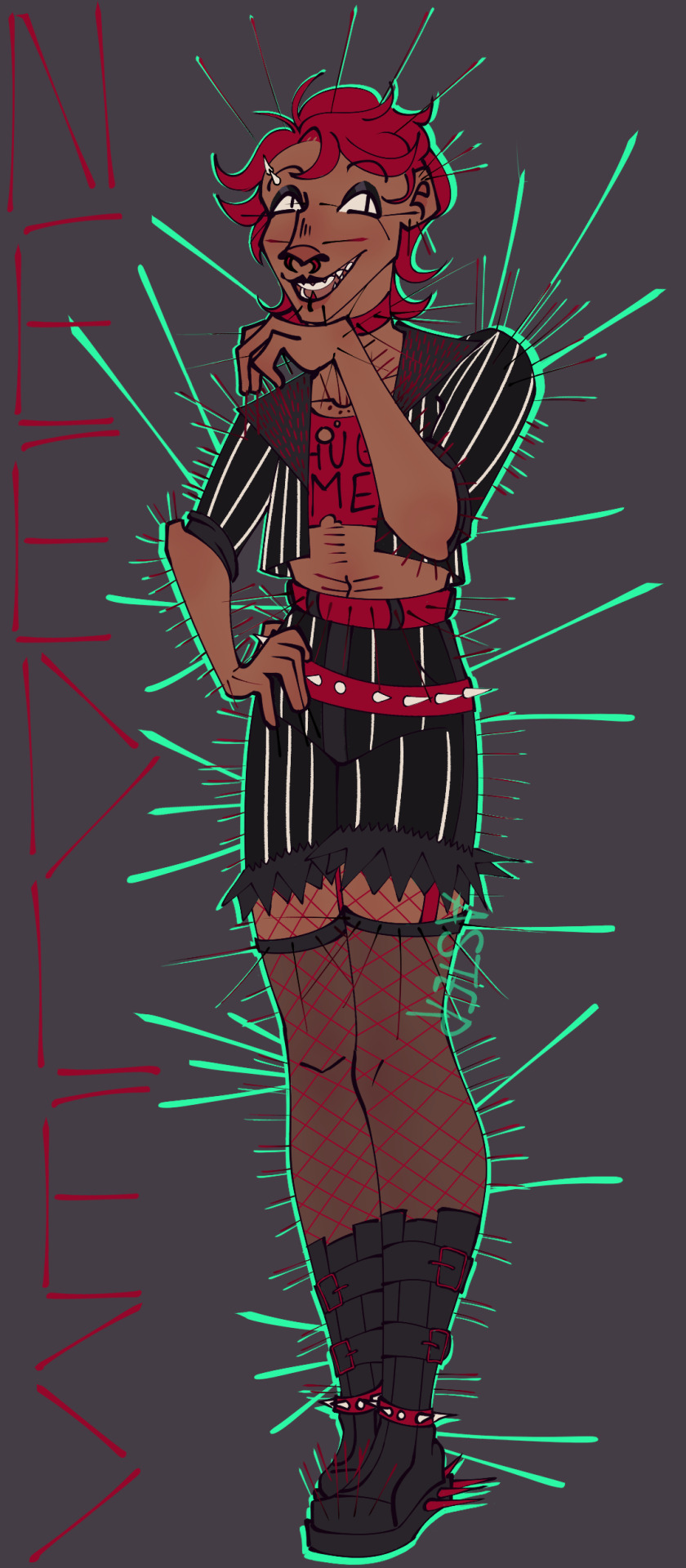
#tmagp#tmagp 6#tmagp fanart#tmagp needles#tw nongraphic/stylistic needles#god I'm so normal about this character#pathetic creature /aff#I would've given them more needles but it would've made things too confusing bc of the pose#so consider this an undercover needles design lol#new headcanon unlocked#they definitely spike up a lot more when aggressive#or when they sense fear#like a porcupine if porcupines were avatars of eldritch fear entities#is this an accurate design?#hell if I know#but one of my friends said that they look like a rat#so I feel like I've at least accomplished something#love that the nose needles look like a really spiky mustache#kind of gender of them tbh
29 notes
·
View notes
Text
oh my god. pro hero Bakugou who was shortly dating someone and accidentally got them pregnant, but for some reason, after having the baby they leave. he’s fucking devastated—how is he supposed to continue his career now as a single dad? how can he care for baby? save the world and still have to stay up at 2am when they’re fussy bc he hasn’t held them all day?
his mother helps as much as she can, his father too. but they’re getting older and they shouldn’t have to raise another baby at their age.
in comes you, a stay-in nanny. he researches the fuck outta you, frowning at you all the while during your interview. it doesn’t scare you much tho, as he’s patting the tiny baby back with only two big fingers. he wants to see how you react to baby, your stance on teaching them, how you’ll aid them.
he internally caved immediately when the baby started crying and he couldn’t get them to quiet down, so you took them from him. hugged them so sweetly to your chest as you rocked them, spoke quietly to them, a calming aura surrounding you.
it helps that you’re pretty, when he hires you. but he knows he can’t be selfish—you’re here for the baby and the baby only. he has no other place in your life. (unless you want him to?)
#wrote this sluggish on sleep meds#hope it makes sense when this posts!#if u couldn’t tell I’m on a high for dad bkg I fear#something about beeg man handling such tiny bab that melts me#bakugou treats! 🍬#—new treat in the streets! 🍫#dad bkg
2K notes
·
View notes
Text


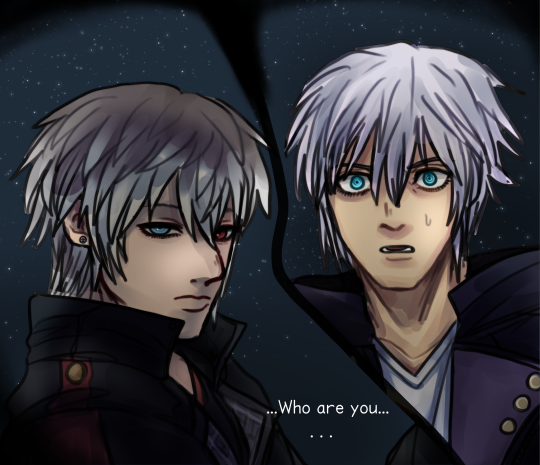
Replaced.
#my art#kingdom hearts 3#kingdom hearts 3 remind#kingdom hearts 4#Sora#Yozora#Riku#The Sleeping Realm Theory#The Necklace Theory#Meteor Shower Promise#you can tell how much I love those moments between Sora and Riku#Soriku#sora x riku#a bit of angst? i suppose#hey remember riku's fear of being replaced :D WELL GUESS WHAT MOTHERFUCKERS#THAT'S RIGHT BABY MORE YOZORA BECAUSE I WANNA SEE HIM MORE#also my theory is that Yozora is a special nobody like Xion (hopefully that makes sense)#but hey it's all for fun (ouch)#KH#KH3#KH4#also this ain't anti soriku i just love angst in my silly heart#BACK TO COMMS BYEEEE#edit 5/22/24: I SPELLED KINGDOM HEARTS WRONG ON THE TAG LMAO I JUST REALIZED WHEN LOOKING THROUGH TAGS#kingdom hearts
617 notes
·
View notes
Note
Hello, I'm not sure if you're aware, but tumblr is going to start helping midjourney gather data for their AI. You're one of the artists I follow here pretty actively and I wanted to warn you to maybe start nighshading your art before posting it here so it doesn't get swept up!
I've seen a couple of posts about it. Feeling disappointed but not that surprised. Also not excited about having to start nightshading/glazing my pieces but if there isn't going to be any serious regulations regarding data scraping and ai "art", there aren't a lot of choices.
Thank you for taking the time to warn me just in case, it was very thoughtful of you!
#from what I've seen the effectiveness of nightshade/glaze has been debated and I don't even pretend to understand how it works#but like watermarks it's at least some kind of preventive measure a token effort to stop your art from being stolen and misused#but I fear that if someone is determined to do it anyway chances are they will find a way unfortunately#this shouldn't be the reality of trying to share art online#it's a pretty dismal situation when this responsibility falls on the artists themselves#I've been here since 2011 I've lived through multiple tumblr apocalypses I'm not leaving unless they make this place wholly unlivable#and I don't think there are truly good alternatives with similar sense of community and as varied posting and customization options#it seems like every other major social media platform is doing this exact same thing if not worse#answered#ohdeergood#I'm tired we're all tired of this
418 notes
·
View notes
Text
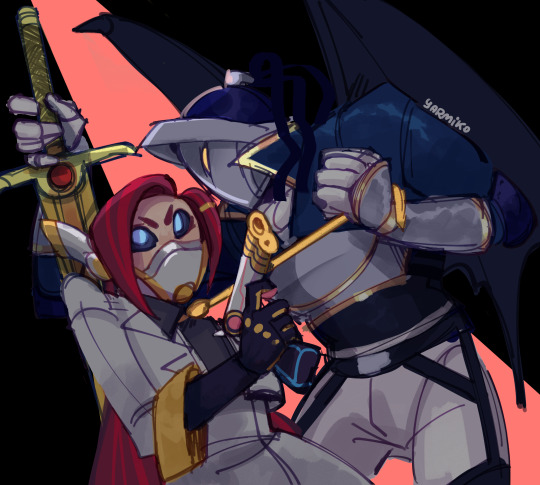
First base is mutual threats
A redraw of this thing I made two year ago. Still love the dynamic
Engaging in verbal passive-aggressive conversations with each other is actually very entertaining passtime. This is why their post-Robobot\pre-Star Allies interactions are so fun to me: this is a very shaky ground, riddled with mutual loathing. Susie, who really isn't doing very well after Max dying (technically her fault) and getting the CEO's status to pressure her. Also not actually processing her trauma in AD, but repressing it along with most of her emotions. And MK with his wounded pride, who is frustrated with himself first and foremost. And genuinely not trusting the new CEO of intergalactic corporation, which is kinda valid
I guess I just love the trope of "this evil\annoying person you preserve them as, turns out to be not so evil/annoying"

#This is how true love looks like guys trust me#Funny enough the one who start the conflict is MK usually. Who is very petty\unnerved due to the wounded pride with genuine unease around S#And his way of dealing with his fears is unhealthy at best. Despite MK saying otherwise#Calm collected and stoic knight can be pretty good at passive-aggressive snide comment when he wants to#But please 50% of Susie's job is making very polite vague death threats - she can and she WILL push back the backhanded remark#Tho she is kinda flattered to be THE person infamous Meta Knight is eery of. That means she is a force to be recon with#This brings some wierd sense of safety#Metasusie#It's very much implied#Kirby fanart#Kirby series#Kirby Gijinka#Susie Kirby#Susie Gijinka#Susie Haltmann#Meta Knight#Meta Knight gijinka#YarArt
194 notes
·
View notes
Text
Riz Gukgak and his bloody hands
SUCH a metal visual and motif. Kalina, Baron, they tease him for it, they twist it into one of his worst qualities, just as they belittle that he his heart, leverage his fear that he cannot love anyone enough.
Riz Gukgak loves. He will claw himself to shreds on love. He will dig through reality, lacerating himself on crystal, just to help his childhood friend. He will hiss at the devil, he will bite out eyes, he will do anything to help his friends feel safe. He will attempt to eat an entire dragon. Out of love for a father he barely knew.
"That’s you saying “I love you” to the people who matter to you the most."
#sorry lads I'm still thinking about him#something about speaking an entirely different language of love from everyone else but trying to hold a conversation anyway#Baron and Kalina preying on his fears that he can't possibly love enough to be important#when this is a kid who will tear open his own skin on the harsh surface of love#yeah he should maybe calm the hell down about it#but his friends and his family are never scared of him. they never look down on how he shows he cares.#something about being ace and not being soft or gentle#am I making sense#he needs healthier ways to love but he's just a kid. he's figuring it out.#fantasy high#dimension 20#d20#riz gukgak
637 notes
·
View notes
Text







bau members + near death experiences
#criminal minds#criminalmindsedit#criminalmindsverse#proceduraledit#emily prentiss#emilyprentissedit#cmverse#cmverseedit#tvedit#filmtvcentral#dailyflicks#spencer reid#elle greenaway#penelope garcia#aaron hotchner#derek morgan#mine#edit#*#category*#tag meta#DO YOU EVER CRY FOR EMILY PRENTISS#every other member having something positive when they coded and none for emily prentiss byeeeeeee#i think what i hate (love) about it so much is that - as a show with no ~proof of an afterlife - it's a valid interpretation that#emily is doing this to herself. that everyone else's brain supplied them with comforting thoughts and people in their final moments#and in most cases something that person NEEDED to hear to bring them some fundamental sense of peace#except for emily. emily offered herself no comfort and no peace and i think that is truly one of the most heartbreaking things about her#whether she didn't think she deserved it or didn't know what to offer herself...the woman who is always running away from and back to#the people that she cares about...who she wants nothing more to protect and fears nothing more than hurting them...#who make her feel wonderful and terrible all at once...so what would she conjure to give herself peace? what /could/ she possibly see?
219 notes
·
View notes
Text


the newly vassaled gerudo king is inexplicably handed a baby
#tloz#legend of zelda#ocarina of time#oot#zelda#ganondorf#i actually think he would’ve been a teenager or so around the time zelda was born but. this is just for sillies so#and no idea when he actually swore fealty to the king. i actually feel like it might’ve been a bit before the events of the game#in my head it’s like. the war just ended and impa hasn’t been assigned as zelda’s attendent yet#and newborn baby zelda is somewhat of an afterthought atm and whoever was holding her before suddenly had urgent business to take care of#and ganondorf is like the most visible person in the vicinity and also everyone is treating him like shit because he Just Lost The War#and no one takes him seriously anymore despite Everything so it’s like haha oh ok so i’m just demoted to Giant Babysitter huh#for the next 5-10 minutes or so. i’m not apoplectic or anything rn#already having one of the most humiliating depressing weeks of my entire life what’s one more humiliating thing#meanwhile baby zelda is like *has no object permanence or sense of fear yet* Holy Shit Its Boar From My Visions
1K notes
·
View notes
Text

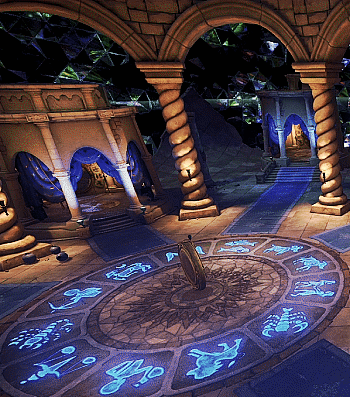
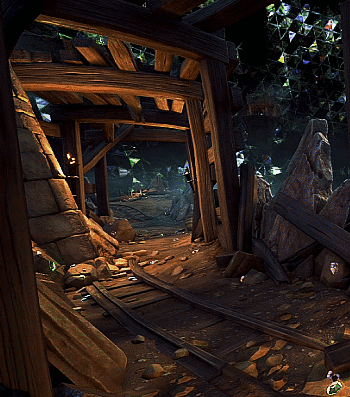

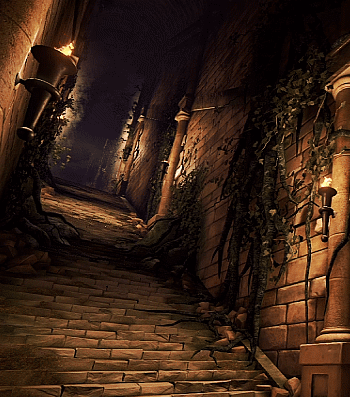

Kingdom Hearts 0.2 Birth by Sleep - A Fragmentary Passage - The World Within
#kingdom hearts 0.2 birth by sleep a fragmentary passage#kh0.2#the world within#dwarf woodlands#realm of darkness#scenery#my gif#this world is interesting because it's so different from the rest#the sky looks like some sort of dome with triangular screens that project a broken glitchy sky#almost as if it takes place in some kind of data simulation#which i don't think is the case but it adds to the feeling of aqua's experiences here not feeling ''real''#i mean this place hardly even resembles what the original world is supposed to look like#like it changed to match aqua's psyche. forcing her to look at her own reflection and confront her own fears; doubts; guilt; and sadness#actually now that i think about it this feels extremely fitting for this world#it's like when snow white was running through the forest and was so afraid that it made the trees around her look alive and dangerous#except aqua has to wander this broken world and face her dark thoughts that take shape by looking exactly like her#she's constantly running in and out of mirrors into rooms that make no logical sense like the endless staircase and the pillar maze#there are ghostly echoes spoken in her own voice that mock her by saying no one can save her and no one wants to. it's chilling#i can't even say for sure if the phantom aquas are actually physically there or if it's all in her head#similar to how she'd see visions of terra and ven#she's such a tragic character
506 notes
·
View notes
Text
Trapped Fear
At first Fright Knight was not loyal to Pariah, maybe it was because he was the combination of many warriors and he knew that tyranny would lead to nothing. However, because of this the former king engaged him in battle and captured his core, making him loyal.
Like all Ancients, Fright Knight could survive without his core but had to obey the person holding it. He and Clockwork shared that unfortunate fate, though Fright Knight considered being at the mercy of the Observants far worse.
When Danny defeated Pariah Dark his control over Fright Knight stopped, the knight foolishly thought he would take back what was his, but the old king was selfish and thrown the stone of fear into the human world, where he knew Fright Knight would not enter.
Disappointed but used to it, Fright Knight resigned to not finding that part of himself, he served Danny from that moment on, becoming his protector and above all, his friend. Until someone found his core and instead of being free, he was summoned and resigned to fulfill the words of his new owner.
Of course, Danny was worried when his knight disappeared from Phantom Palace, and after a long search he found his whereabouts in a city: Gotham. A man called "Scarecrow" was spreading fear in the city, and it seemed very familiar to him.
After a fight with the bats he got the information he needed: his knight was following the man. When he went to face his old friend, the king noticed that Fright Knight was not speaking on his will, he was crying and sending messages of help that only he could understand. The King was furious, and maybe it was time to show why no one messed with what was his.
#dpxdc#ghost king danny#jonathan crane#I like to think that Ancients can survive without their cores#But need to obey whoever has it#Clockwork was doomed to this destiny first#The other ancients were cautious after it#But Fright Knight was the youngest of them and didn't know the story#So he ended serving Pariah Dark#dp x dc#dc x dp#Crane found Fright Knight core out of luck#he didn't know what it was#just that it caused fear on people's mind#When he accidentally summoned Fright Knight he was delighted#The God of Fear had subservient to him#The Bats were worried about Crane sidekick#They didn't hear his reluctance or cries for help#those are emotions that only ghosts can share and understand#Jason maybe sensed it a bit and that's why he felt hesitant to attack#Danny is really mad with the situation#dp x dc prompt#dp x dc crossover
2K notes
·
View notes
Text
Double Indemnity, Spellbound and how a retroactive plot twist kicked the communities ass (which also has some VERY interesting implications for Aventio)
I had a very enlightening conversation on TikTok about the nature of these two romance/thrillers, and while unfortunately, I have no idea how to watch them, the plot synopses I’ve seen and analysis other people have made have caused me to come to this conclusion/interpretation of these references:
On the first viewing of the Double Indemnity questline, the reference to the DI movie is meant to be played straight, with Aventurine and Ratio being just as doomed to fail as they are in the movie, and their relationship as equally as toxic and fake.
On second viewing, it’s the complete opposite, and the track (and other movie reference) you receive at the end, Spellbound, proves it.
Let’s start with Double Indemnity.
Also disclaimer I’m gonna be over simplifying the plot/themes of these movies because a) both are singular references, DI is only referenced in the name of the quest itself and Spellbound is only referenced in a track you receive once you complete DI, and references this small probably aren’t meant to be anything more than a fun Easter egg for those who notice it b) this is hoyoverse they aren’t clever enough for that anyways c) the nature of references isn’t going to be having everything be the exact same anyways, so I’m just going to go with the overall interpretation of DI + Spellbound/their impact, picking the stuff which aligns with the actual plot of the DI quest, I don’t care what happens in one frame at 30:01.56 minutes in and neither do the writers
Anyways, how does the Double Indemnity reference on the first viewing seem?
On our first play through of the Double Indemnity quest, we are made to believe that Dr. Ratio and Aventurine do not trust each other, but they are begrudgingly working together for the sake of stealing Penacony for the IPC. Then, Aventurine makes it seem as if he wishes to use the singer Robin’s- also the sister of Sunday, the head of the Oak Family and the one they are negotiating with- death as a means to pressure Sunday into forking over some of the Family’s secrets, which Aventurine will then use against him in future negotiations.
With this setup, the Double Indemnity reference is a solemn warning- Aventurine and Ratio will fail.
You see, in the movie, Phyllis Dietrechson intends to kill her husband in order to earn the money from the Double Indemnity clause (which is a real legal thing btw!), roping in one Walter Neff when he falls for her. However, their relationship isn’t stable and in the end, Walter betrays Phyllis, ratting her out to the investigator Keyes, ultimately meaning they don’t earn the DI clause, also killing Phyllis in the process.
Hopefully you can already see where I’m going with this, but it’s time to draw some fun parallels.
Sunday is Keyes, Ratio is Walter, Aventurine is Phyliss and Robin is Phyliss’s husband.
Although Aventurine a) isn’t married to Robin and b) he didn’t actually kill her, he is the one who witnessed her “death” and in the first viewing of the Double Indemnity quest, we are made to believe he intends to profit off of it, although this time the payout isn’t money: it’s Penacony.
To do this, he enlists the help of Ratio- albeit not seducing him, but still convincing him to help nonetheless- and together they go to meet Sunday for negotiations.
However, Ratio “betrayed” Aventurine, ratting him out to Sunday behind his back and informing him of his plan, which mirrors how Walter confesses to Keyes. This results in Aventurine being sentenced to death, much like how Phyllis dies by Walter’s hand, Aventurine seems like he will die by Ratio’s, calling him a wretch before slinking off.
And there you go, their partnership is as doomed as the one in the movie, failing because their trust + love didn’t hold up till the end, a devious foreshadowing.
At least, that’s how it seems on the first playthrough.
Because Aventurine and Ratio’s plan SUCCEEDS.
And on the second viewing, knowing that the betrayal is fake, you realize they succeed because they do the one thing the people in DI (and I’ll get to Spellbound) DONT do- they actually TRUST each other.
Ratio and Aventurine’s plot is a success. And it’s because they deliberately made it seem like they were doing a Double Indemnity plot. Like they were going to make the same mistakes as the characters in the movie. Sunday falls for the false appearance hook, line and sinker, and that’s his downfall.
They win because they TRUST each other, you can even say because they actually LOVE each other, unlike the characters in the movie, where it’s more list than anything else. Walter and Phyllis don’t make it together to the end but Ratio and Aventurine DO, and they get to continue on with their lives because of it.
The reference to Double Indemnity in this quest is genius because it works both before and after you learn the retroactive twist of Penacony. It makes you believe Aventurine + Ratio are doomed to fail, and it makes you realize they were always going to succeed, expertly dawning the false appearances Sunday expects from them, becoming literal actors playing out the roles of two people who will fall short due to their selfishness. Sunday believes he’s seen this film before which is why he BUYS IT, and god it’s just beautiful looking back on it. He thinks he’s Keyes about to uncover a dastardly plot to profit off his sisters death, and in turn he paints Ratio and Aventurine with the identities of those he believes would do such a thing, which they do their best to play into. Ugh it’s amazing.
And now, for Spellbound.

You receive this track after completing Double Indemnity, containing the description above.
Now, this is a reference to Spellbound, another one of Hitchcock’s films.
The main characters in this one are Dr. Anthony Edwards, a man suffering from amnesia, and Dr. Constance Peterson, a psychoanalyst who he was meant to replace, who discovers a dark secret about Edward’s while they fall for one another; he’s an imposter. He believes he killed the real Dr. Edward’s, but she thinks he’s just suffering from a guilt complex. Fake Edward’s goes missing, and the real Edward’s assistant arrived and informs them that he’s missing. She finds Fake Edward again, living under the pseudonym John Brown, and although he tries to leave, she convinces him to stay, telling him that with the help of her mentor, psychoanalysis can help recover his lost memories.
Through an incredibly complicated psychoanalysis of dream, Constance begins to uncover the truth- learning the person who believes himself to be Dr. Edward’s (and is using the pseudonym John Brown) is actually a man named John Ballantyne. Ballantyne accidentally caused the death of his younger brother in the past, resulting in his deep guilt, as well as recalling the location where the real Edwards died- skiing off a cliff to his death. With his memories, they find the body, but it has a bullet wound, so Ballantyne is taken into custody.
However, her boss, Dr. Murchison lets it slip that he actually used to know (and didn’t like) Dr. Edwards, and through another complicated sequence gets him to confess his guilt and ultimately kill himself, which frees Ballantyne, ending the movie with the two going on a honeymoon.
So, what does this mean in the context of the quest line?
Well, let’s say Ballantyne and Constance are representative of Ratio and Aventurine respectively.
“Every psychoanalyst must first have someone else diagnose them.”
If we read Aventurine as the psychoanalyst (Constance) and Ratio as the diagnoser/doctor (Ballantyne), it reveals an interesting interpretation.
That being that they knew the truth from the start/ they had already succeeded.
Or in other words, unlike in Double Indemnity, in Spellbound, they actually succeed.
In the film, Constance is the one doing the diagnosing, the one trying to figure out the truth, and you can see that in Aventurine pretending he’s trying to find out the truth behind Robin’s death. However, in the DI quest, it’s the opposite. Ratio’s as Ballantyne is the one doing the diagnosing for the psychoanalysist, Constance, or rather, Aventurine.
To diagnose someone, you must be very familiar with them, or at the very least the ailment plaguing them, and Ratio he knows Aventurine through and through at the start, and what plagues him (his own sense of meaninglessness) unlike the protagonists in Spellbound who despite falling for one another quickly, don’t begin being intimately familiar with one another.
In this way, they have already succeeded. Aventurine and Ratio already know one another, and while they might not know the reason behind Robin’s death, that was never what they were searching for in the beginning, meaning they effectively can skip through all the drama (aka the ups and downs of Spellbound, finding out the truth behind Robin’s/Edwards’ death), and reach their happy ending- a honeymoon; or in DI’s case, Aventurine attaining his cornerstone, and fulfilling his end of the plan.
Interestingly, Aventurine slots into the role of Ballantyne and Ratio as Constance equally well, with the phone call Constance makes to save Ballantyne being reminiscent of the note Ratio makes to save Aventurine, as well as Aventurine being the replacement, or in the sense, the one to find the truth about Robin.
Personally, I think Aventurine and Ratio are reminiscent of both the main leads in Spellbound, which is why it’s complicated to discern the meaning of the reference. Oh how I wish I knew what the original Chinese description for this was (if you do please tell me 🙏).
Is it just meant to signify them being in love? Is it meant to signify that they will succeed, due to how well they know each other? Is it both, which is what the inclusion of Double Indemnity (the movie) suggests?
Either way, it adds onto the already present idea that the trust between Aventurine and Ratio is what allowed them to succeed in Penacony, and that’s not just something expressed by these movie references.
Think Aventurines Eidolons: Stag Hunt Game and Prisoner’s Dilemma, both of which are game theories about trust. Or how Aventurine says that Ratio knows him best, or how Ratio entrusts Aventurine with close secrets of his, like him being the “Genius” of the council of Mundanites.
“Do you trust me?” “That depends on you.”
These are 2 lines in their 2.0 conversation that really stick out to me. Ratio will always offer his trust so long as Aventurine can prove himself worthy of it, and as we have seen, Aventurine always delivers, proving himself long before Penacony in the Final Victor lightcone, albeit in his weird homoerotic way.
Therefore Ratio will always trust him.
And because of that, they win.
Now whether you take the deep trust between them to be romantic or platonic, or infer the literal honeymoon at the end of Spellbound to mean something for Aventio, either way the feeling absolutely there, and it’s crucial for an understanding of their relationship.
Also damn, the retroactive plot twist fucking slaps.
#hsr#honkai star rail#dr ratio#aventurine#aventio#ratiorine#Sunday hsr#Robin hsr#poor Robin gets mcguffined in this I fear#I need to watch these two movies for real but idk what streaming served would even have them 😭#Thanks Wikipedia for the plot summary ily#Me reading the “the went on a honeymoon” on Wikipedia as the ending for SB 🤨#Aventio honeymoon when#I think it’s romantic but unfortunately I have been bullied into believing the romance in SB is toxic#Even though it’s clear now that any notion of that is just due to Ballantyne’s trauma#I mean they go on a fucking honeymoon#Imo if the film didn’t support them why do that then?#Especially because Ballantyne is innocent#This was so much fun to write#I hope it made sense#Thanks for reading :)
125 notes
·
View notes
Text
Riz has counted four casseroles this week alone. Five, if one goes by the method of cooking, but Yelen's scary when she's crossed, and calling her burek by its proper name is important to her, so Riz does her the courtesy and doesn't include it in his mental tally.
He holds the tupperware over his head to keep it out if the way as he takes careful steps over the piles of notes in his path. The dockman case just closed, relevant documentations handed over to relevant personnels, evidences dealt with as needed; all he has lying around now is just record of the process and traces of himself thinking through it. Unsurprisingly they still haven't invented a surface more convenient for people under five feet who like to pace to put pieces of paper on than the ground.
Actual records go into the case folder with the other documents. Anything else with at least one side still blank is going to the school kids in the block - they chew through an astounding amount of paper just learning arithmetic. The rest is for the recycling basket.
Later. It's his mandated lunch break right now.
Riz sits down in front of the corner file cabinet. In an office often overrun with papers and strings and sometimes even thumbtacks, he's never really managed to clutter up this exact square of surface like every other ones. Ever since the bottom drawer rattled for no discernible reason a day long past, his eyes have always just kinda decided to slide across the space without acknowledging it.
It's years out, now. Riz doesn't know why he thought it such a big deal anymore, back then. He wasn't scared, he doesn't think. Not anymore. Maybe just uncomfortable with the idea that certain things persist despite all efforts to change.
He opens the tupperware. Dame Carabelle's experiment greets him with enough spice in the aroma alone to knock out a small mammal. When he chopped the vegetables for this casserole he couldn't really imagine the eventual heft of it, evident even through just these few ladles' worth, maybe weighing heavier for being still warm. His folk eat more through the smell and the textures and the aftertastes than the taste itself. His folk's meal is really the cooking rather than the eating. The eating is the meal's end.
"Hey," he tells the file cabinet's bottom drawer. "Um."
It's the anniversary. Riz doesn't know the exact date of his dad's death; nobody currently alive does. He and Mom both use the date of the funeral, though as he moved out to Bastion and then got more directly involved with Interplanar he hasn't really been going to Dad's grave as much. Doesn't seem like very efficient use of his time, catching a train or borrowing a car or spending a whole spell slot on going somewhere he knows Dad isn't at. They're sorta coworkers now. They talk on and off every other week between missions. When he goes now, it's just to clean up the place, keeping the landmark tidy and respectable.
Without that work to mark the date he doesn't really know what it serves anymore. But he still remembers it. Still takes note, absently or not, when it comes around.
There's not really a good way to tell the drawer that. Riz looks for another way to start the... conversation, hopefully. The question at play, he'd guess, is why he's doing this. He's been pretty content ignoring all the rattlings and the knocks from inside and the times it sits slightly ajar without him ever opening it himself; hell, he still uses the three drawers on top of it. Space is fucking precious in Bastion.
Precious enough to finally fix this damn drawer so he gets his turn to use it? Riz asks himself. Is that what we're getting to? Then he dismisses the thought - he didn't manage to fix it the times he actually tried, let alone-- now. When he doesn't really care that much to.
That's probably a good place to start. "'s fine if you keep being in there, turns out," Riz says.
The lunch hours are quiet in the block, sleepy and bright with the brief window of sunlight that manages to break through roof overhangs and extended balconies and laundry lines and climbing vines. Riz's work isn't loud here (the loud parts happen away from his office, if everything goes right), but the fragment of early summer heat reflected in the steady warmth his meal still carries compels him to lower his voice even more. It makes the words feel intimate, in a way he's never been familiar with - if he says something he just says it. He doesn't whisper. If he gives his friends something, he gives it open-palm. He's found out, along the way, that people usually don't think of rituals and courtesies the way he does.
Small voice for a diminished monster. "You know why I think so?" Riz asks. "Because almost two decades ago you kidnapped me and almost killed me, and now you rattle a drawer in my office."
It doesn't sound as much like a taunt as Riz wanted it to; the drawer has made a lot of noises again this morning when he checked the calendar, and he was definitely annoyed at it. Now, though, facing it like this after cooking the whole morning with more grandparents and peers from the block than he can count on both hands to cater for a tenant union meeting, he thinks the annoyance has morphed. Changed shape.
It has the shades of something like pity. Riz is not prone to pity, and especially not at these kinda matters. It's slightly maddening that he coheres perfectly outside of this one spot. That he commands his spaces, except for a drawer.
He puts the tupperware onto the floor between himself and the cabinet. "I know we're aware it's the anniversary," he says at the drawer. "You do this every year. You make a ruckus every time I decide to go do my job instead of mooching off my friends' aircon, and every time I get an invitation to some stupid social thing I want to turn down, and every time one of the old people tries to introduce me to a child or a nibling, because being a bachelor over thirty is weird," he pinches the bridge of his nose. "I have three fucking jobs. I love doing my fucking jobs. I'm forcing funds into infrastructures. You're never leaving, are you."
The drawer vibrates lightly. It's a very, very mild acknowledgement, considering the history of reactions Riz has gotten from this thing. Riz thinks it's emanating joyous agreement, or satisfaction.
It only sharpens the pity. Riz doesn't like that, but it's how it is. That's, ultimately, the lesson he's been taught over and over and over again, just by existing as himself, turned every which way by space after space that don't see him eye-to-eye: it's not like he'd quit living over any of it. It's not like any of it can sand off these fundamental pieces of him.
He's outgrown a lot of things, he's found out. Again, and again, and again. A childhood home, a yearly trip, a monster.
"'s probably scary for you, huh?" He asks. "Because I left."
He thinks he hears joints creak that sound like you did. Probably the way a scorned lover would say it, in a movie or a yellowback. He has no more connection to the idea than he did as a kid. Less, because it doesn't even scare him.
"That's what it is, right? That it's the anniversary, and I'll never be like Dad." He raises a knee from the floor, pulls it back closer to him. Slings an arm over it. "You love to remind me. The thing is, Dad also left. He loved Mom and he loved me, and none of us wanted it to happen, but it still did. Because love does fuckall to make anyone stay on its own."
He's long past being bitter about it. It's just the facts. Once upon a time he looked into the future and the specter of his friends' happily-ever-after casted lightless, fathomless shadow over him. Love, marriage, that kind of devotion, to a fifteen-year-old with more solved cases than friends seemed so eternal. Final.
But you can only watch your friends build up apps' worth of jilted lovers for so long before getting over it.
"You know what I learned?" Riz tells the drawer. "Love doesn't make anyone stay. Project management does."
He stands up, and picks up the tupperware of Dame Carabelle's casserole, that he helped make, that he helped share with a block's worth of neighbors and members of a community he's at home with, and goes sit at his desk to eat. "Last chance to get any," he drops an offer over his shoulder as he walks away.
He doesn't eat all of his share in one go. What he's spared he leaves on the desk when going outside for a smoke break. Baron looks the exact same as when he saw them last, when he catches a glimpse; they haven't grown at all. They aren't there when he comes back inside, but the leftover has gone days-old cold, like someone's sucked the future out of it.
#dimension 20#fantasy high#riz gukgak#baron from the baronies#this is set a Long time into the future. riz is like 32 in this one#''I will go to sleep'' so turns out that was a fucking lie#lmao I just needed to finally externalize this idea into Some kind of more final form#initially I aimed for a comic with this but ooughgoughhh I am. indisposed. unable to do that rn#and also I feel like there would just be too fucking much Riz Saying Words in that format for it to work. and I always go if theres so much#words in ur comic might as well make it a fic. and well. heeding my own advice perhaps#just been sitting on this sentiment of like. perceiving romantic relationships as uniquely permanent or conclusive#when the vast majority of people I know would hugely benefit from a divorce lmao#since watching fhjy at least. I think in a sense this is kind of my personal answer for that sticky note style comic I did way back thens#how much of that fear of being deprioritized comes from not being taken care of by the community you're in#I think that's the prettiest answer I can give for riz's deal. not one singular Special Person no matter the kind of flavour#but spaces that he's integrated in. that he has a hand in building even#okay NOW I sleep. everyone be quiet ok small voice for good sleep. it wont be a lie this time I prommy
103 notes
·
View notes
Text
tw slight mention of sex trafficking
ok so I know this has probably been brought up a lot here but I just saw someone on twitter make an AMAZING point about Klaus's character growth from s1 to s4. The tweet boiled down to the fact that through the seasons, Klaus's character lost a significant amount of his queerness/ feminity. In season 1 we see him wear skirts, makeup and traditional feminine things much more freely than we ever do after s1. I understand why this was done for seasons like s2 where he was literally in 1960's Texas and at risk of being hurt for how he presented himself but strangely his self-expression becomes tied to his drug abuse pretty early on.
In s4 we see Klaus as a new sober hypochondriac version of himself that formed from the lack of his powers and newly acquired mortality. He loses a lot of his self-expression too in this season only ever wearing less traditional male clothes when he's literally being sex trafficked and high for the first time in about 3 years. His queerness becomes linked to his drug abuse and tendency to have unhealthy sexual relationships which I've always found odd.
I've kept this thought in my drafts for a while because I thought I was looking at his character the wrong way but now I'm reconsidering. St*ve Bl*ckman's newly found out transphobia and homophobia are definitely changing my previous opinion because now the way Klaus's character has progressed,,,,,, makes more sense.
#the umbrella academy#tua s4#klaus hargreeves#tua s4 spoilers#now allison sa'ing luther makes more sense#her character assassination isn't talked about enough I fear#its so odd how one of the only woc leads in the show becomes the big bad and does something so terrible to her brother when it was so#unnecessary#steve blackman i hate you
94 notes
·
View notes
Text
I'm glad more people are pointing out how racist people's reaction to the Toshiro/"Shuro" Laios thing is because oh my god. Like okay hi. I'm an autistic white passing Japanese american. And while I haven't read the whole manga through, I have read bits of their confrontation and I adored it. Like it was really painful but it was also a misunderstanding that is so so realistic and I empathized with both of them.
The stoicism and really specific social rules are something I've had to navigate with my extended family, my Hijichan specifically. I've never had fights or blow ups with him over it, or anyone else for that matter, but being an autistic person who has lots of traits very similar to Laios' and growing up trying to figure out how to effectively communicate with my family- that whole scene, despite how difficult it was to read, was really cathartic. I adored it because I understood both of them and it was exciting seeing that very specific dynamic and how it could blow up written well. Like it was that bit that made me more interested in Dungeon Meshi as a whole because I felt seen in both of them. It is such a well done conflict and I'm obsessed, I was excited to see what other autistic people thought. And then it just turned into white fans completely woobifying Laios and acting like Toshiro is some deliberately ableist aggressor and dismissing the cultural context surrounding his behavior. And needless to say I'm not fucking impressed.
Baffling how many white people talk about loving manga/anime and Japan obsessively but when Japanese Media actually comments on Japanese Culture it completely flies over their heads or is deliberately completely and utterly ignored. I really do hate some of you and I will defend Toshiro Nakamoto until the day I die.
#I love Laios too but I'm starting to hate his fanbase tbh#white autistics learn to see outside yourselves it won't kill you#it was like seeing my fears realized in a way that made sense. I used to be worried my older family members in particular did not like me#bc I'm a lot now but I was A LOT when I was younger. idk. idk. *holds that part in my hands* you don't get it like I do#yes I'm projecting but I'm right so who care. Also my hijichan's name is really close to Toshiro so perhaps I was overcome with feelings#dungeon meshi#toshiro nakamoto#laios touden
131 notes
·
View notes
Note
To me, Machete kind of has the energy of a secondary villain/coldhearted side character in someone else's story that a lot of fans latch onto, moreso than the protagonist. Question is, would he be the villain in anyone's story?
Why, thank you! I'm actually glad to hear he gives off that vibe. I don't think he set out to become a villain but a lot of people certainly view him as one.
#in the 16th century canon he starts out as an introverted but sincerely well meaning guy that never quite manages to find his social niche#he was a sensitive kid and when subjected to enough pressure#his insecurity fearfulness and powerlessness mutate into distrust resentment aggression suffocating repression and self-restraint#I don't think he's a bad person in fact he consistently tries very hard to do the right thing#do his job properly avoid letting people down and get through life with a sense of dignity#but he is supposed to come across kind of cold impersonable and difficult to be around if you don't know him personally (and very few do)#people can sense there's something wrong with him and are put off by it#Vatican is a nest of vipers and as the stakes rise he retreats deeper into his coldblooded untouchable work persona#he has no choice but to start lying scheming blackmailing and eliminating his enemies#in order to maintain his position keep Vasco safe their relationship under wraps and his own head above water#essentially playing by the same rules everyone else in the holy see has been playing with for centuries#eventually he loses his spot as the secretary of state and is manipulated/forced to take on a role in the roman inquisition#and if people were sort of iffy about him before being the authority overseeing trials torture excommunications and executions doesn't help#and since he has so few allies and such an infamous reputation he's an easy target for scapegoating whenever necessary#towards the end it dawns on him that he's become the kind of twisted cruel corrupt person he used to fear and despise#and the guilt moral injury and abject self-loathing had largely sapped him of his will to live by the time the final assassin gets him#answered#anonymous#Machete#Vaschete lore#he thought his dream of priesthood would make him a better person more worthy of admiration safety and love but he climbed too high#and got roped up in the dangerous games that take place under god's nose and slowly got strangled to death
360 notes
·
View notes
Text


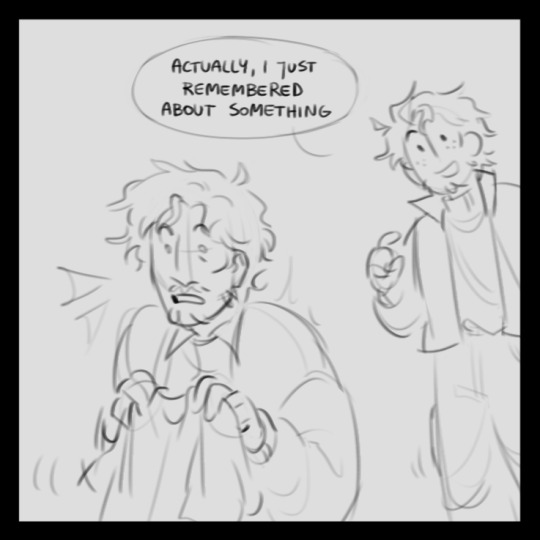
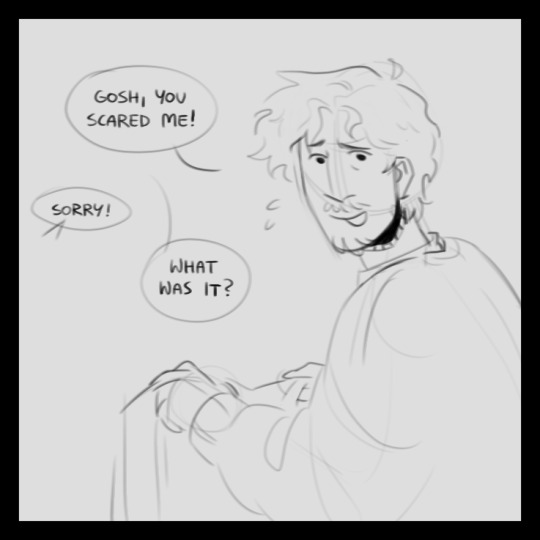





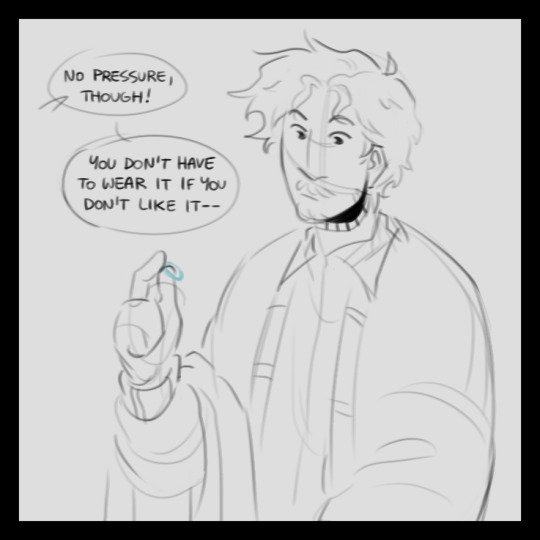
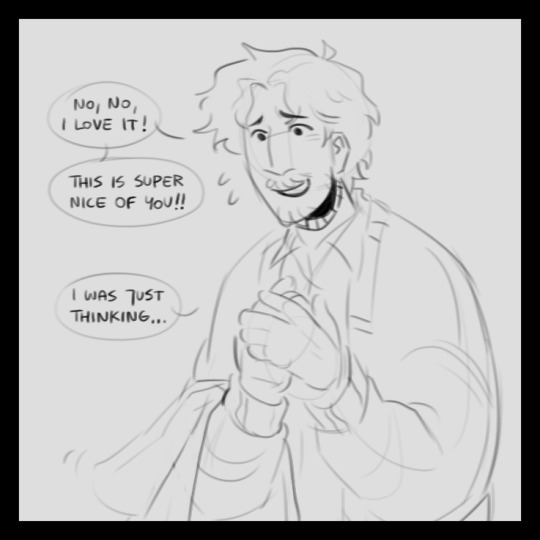
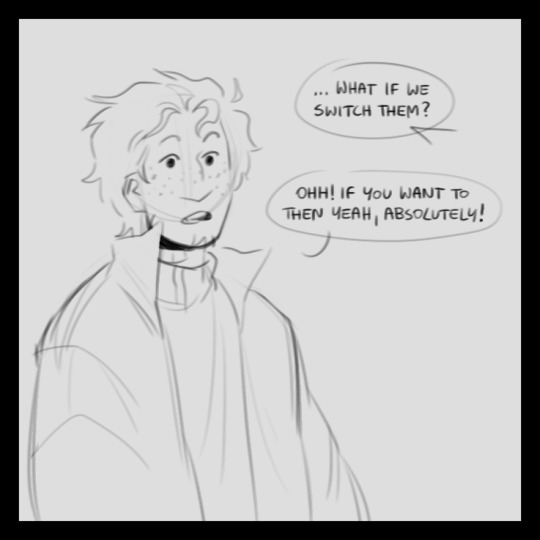

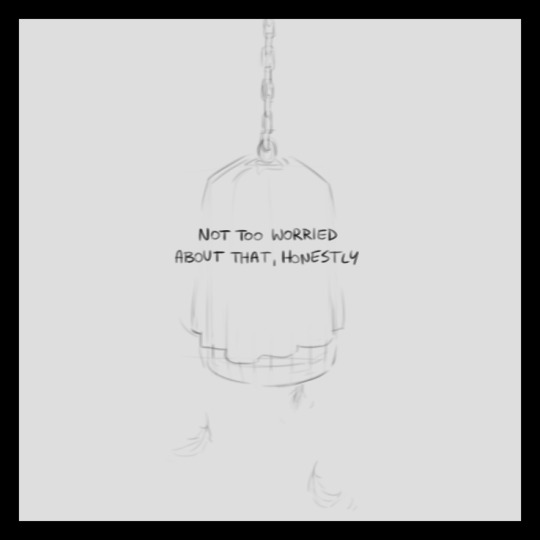

[tma au] tried to format this to be insta friendly because they sure do love their squares over there but i forgot it does Not work like that on here
#bird and a storm au#when you make your first friend in forever so you need to make sure The Curse doesnt get him#i fear this whole thing may only make sense to me. thoughts and prayers#tangotek#tangotek fanart#solidaritygaming#solidaritygaming fanart#rancher duo#team rancher#artwork
338 notes
·
View notes